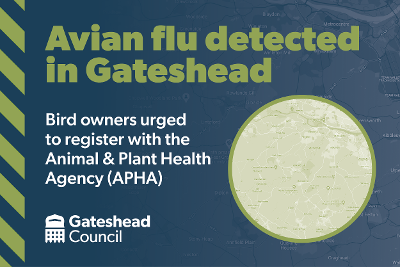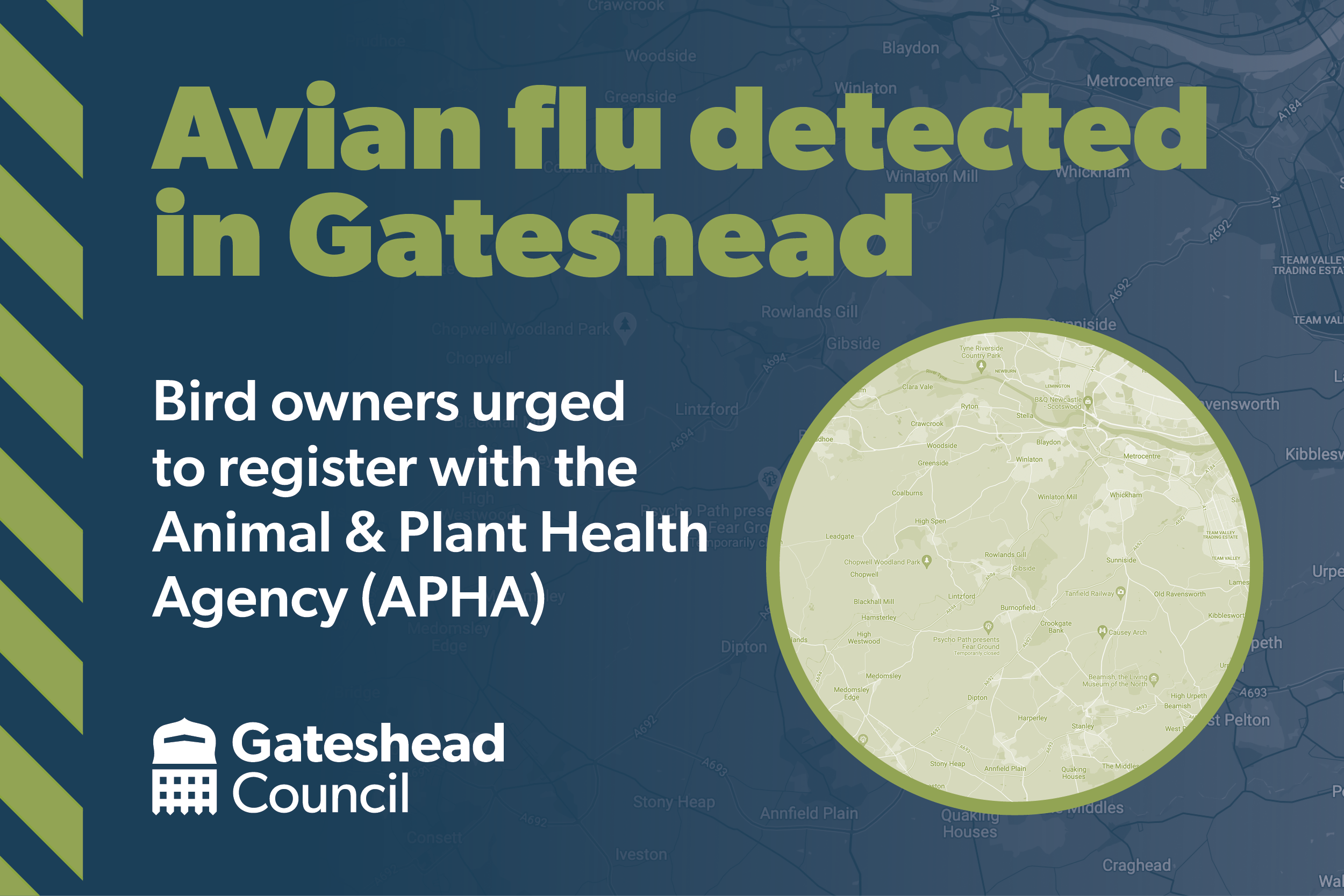Avian Flu found in Gateshead

A confirmed case of Avian Flu has been found in a small number of birds at a private premises in the Rowlands Gill area of Gateshead.
Although, highly infectious in birds, Avian Flu poses an extremely low risk to humans.
A three-kilometre protection zone has been implemented. Within this zone, which includes farms, allotments, smallholdings and domestic premises, restrictions on the keeping and movement of poultry and caged birds have been put in place to prevent the spread of the disease. You can use the interactive map on the Gov.uk website (opens new window) to check whether your address is within the protection zone.
Residents within this protection zone who have poultry or captive birds on their land or in their home are asked to register these details with the Animal and Plant Health Agency (APHA). Registrations can be made on the Gov.uk website (opens new window). Anyone experiencing difficulty in making their registration can email tradingstandards@gateshead.gov.uk for advice and support.
As a number of outbreaks have recently been identified across the UK, all bird owners are being asked to register with APHA to ensure the safety of their flocks.
Suspected cases of Avian Flu in poultry or captive birds must be reported immediately by calling the Defra Rural Services Helpline on 03000 200 301. If dead wild waterfowl (swans, geese or ducks) or other dead wild birds, such as gulls or birds of prey are found, they should be reported to the Defra helpline on 03459 33 55 77. Do not touch or pick up any dead or visibly sick birds that you find. If you are in contact with any animal, always wash your hands with soap and water.
UK Health Security Agency has confirmed that the risk to public health is very low, and the Food Standards Agency has said that bird flu poses a very low food safety risk for UK consumers.
Further information about signs and symptoms of bird flu and how it can be transmitted can be found on the NHS website (opens new window).

A confirmed case of Avian Flu has been found in a small number of birds at a private premises in the Rowlands Gill area of Gateshead.
Although, highly infectious in birds, Avian Flu poses an extremely low risk to humans.
A three-kilometre protection zone has been implemented. Within this zone, which includes farms, allotments, smallholdings and domestic premises, restrictions on the keeping and movement of poultry and caged birds have been put in place to prevent the spread of the disease. You can use the interactive map on the Gov.uk website (opens new window) to check whether your address is within the protection zone.
Residents within this protection zone who have poultry or captive birds on their land or in their home are asked to register these details with the Animal and Plant Health Agency (APHA). Registrations can be made on the Gov.uk website (opens new window). Anyone experiencing difficulty in making their registration can email tradingstandards@gateshead.gov.uk for advice and support.
As a number of outbreaks have recently been identified across the UK, all bird owners are being asked to register with APHA to ensure the safety of their flocks.
Suspected cases of Avian Flu in poultry or captive birds must be reported immediately by calling the Defra Rural Services Helpline on 03000 200 301. If dead wild waterfowl (swans, geese or ducks) or other dead wild birds, such as gulls or birds of prey are found, they should be reported to the Defra helpline on 03459 33 55 77. Do not touch or pick up any dead or visibly sick birds that you find. If you are in contact with any animal, always wash your hands with soap and water.
UK Health Security Agency has confirmed that the risk to public health is very low, and the Food Standards Agency has said that bird flu poses a very low food safety risk for UK consumers.
Further information about signs and symptoms of bird flu and how it can be transmitted can be found on the NHS website (opens new window).
